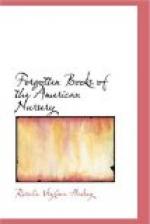The children of the Tories had also their part in the struggle. To some the property of parents was made over, to save it from confiscation in the event of the success of the American cause. To others came the bitterness of separation from parents, when they were sent across the sea to unknown relatives; while again some faint manuscript record tells of a motherless child brought from a comfortable home, no longer tenable, to whatever quarters could be found within the British lines. Fortunately, children usually adapt themselves easily to changed conditions, and in the novelty and excitement of the life around them, it is probable they soon forgot the luxuries of dolls and hobby-horses, toy-books and drums, of former days.
In the Commonwealth of Pennsylvania the sentiment of the period was expressed in two or three editions of “The New England Primer.” Already in 1770 one had appeared containing as frontispiece a poor wood-cut of John Hancock. In 1775 the enthusiasm over the appointment of George Washington as commander-in-chief brought out another edition of the A B C book with the same picture labelled “General Washington.” The custom of making one cut do duty in several representations was so well understood that this method of introducing George Washington to the infant reader naturally escaped remark.
Another primer appeared four years later, which was advertised by Walters and Norman in the “Pennsylvania Evening Post” as “adorned with a beautiful head of George Washington and other copper-plates.” According to Mr. Hildeburn, this small book had the honor of containing the first portrait of Washington engraved in America. While such facts are of trifling importance, they are, nevertheless, indications of the state of intense feeling that existed at the time, and point the way by which the children’s books became nationalized.
In New England the very games of children centred in the events which thrilled the country. Josiah Quincy remembered very well in after life, how “at the age of five or six, astride my grandfather’s cane and with my little whip, I performed prodigies of valor, and more than once came to my mother’s knees declaring that I had driven the British out of Boston.” Afterwards at Phillips Academy, in Andover, between seventeen hundred and seventy-eight and seventeen hundred and eighty-six, Josiah and his schoolfellows “established it as a principle that every hoop, sled, etc., should in some way bear Thirteen marks as evidence of the political character of the owner,—if which were wanting the articles became fair prize and were condemned and forfeited without judge, jury, or decree of admiralty."[94-A]




